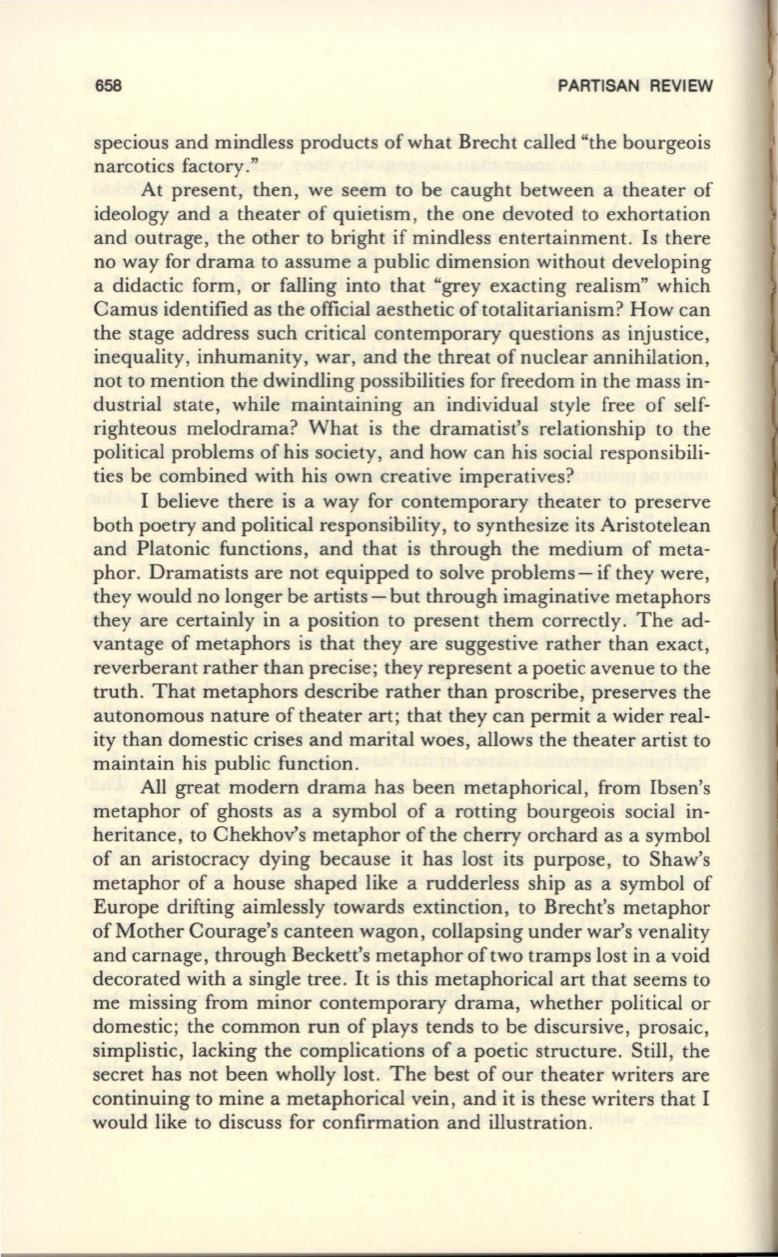
658
PARTISAN REVIEW
specious and mindless products of what Brecht called "the bourgeois
narcotics factory. "
At present, then, we seem to be caught between a theater of
ideology and a theater of quietism, the one devoted to exhortation
and outrage, the other to bright if mindless entertainment. Is there
no way for drama to assume a public dimension without developing
a didactic form, or falling into that "grey exacting realism" which
Camus identified as the official aesthetic of totalitarianism? How can
the stage address such critical contemporary questions as injustice,
inequality, inhumanity, war, and the threat of nuclear annihilation ,
not to mention the dwindling possibilities for freedom in the mass in–
dustrial state, while maintaining an individual style free of self–
righteous melodrama? What is the dramatist's relationship to the
political problems of his society, and how can his social responsibili–
ties be combined with his own creative imperatives?
I believe there is a way for contemporary theater to preserve
both poetry and political responsibility, to synthesize its Aristotelean
and Platonic functions, and that is through the medium of meta–
phor. Dramatists are not equipped to solve problems- if they were,
they would no longer be artists- but through imaginative metaphors
they are certainly in a position to present them correctly. The ad–
vantage of metaphors is that they are suggestive rather than exact,
reverberant rather than precise; they represent a poetic avenue to the
truth. That metaphors describe rather than proscribe, preserves the
autonomous nature of theater art; that they can permit a wider real–
ity than domestic crises and marital woes, allows the theater artist to
maintain his public function.
All great modern drama has been metaphorical, from Ibsen's
metaphor of ghosts as a symbol of a rotting bourgeois social in–
heritance, to Chekhov's metaphor of the cherry orchard as a symbol
of an aristocracy dying because it has lost its purpose, to Shaw's
metaphor of a house shaped like a rudderless ship as a symbol of
Europe drifting aimlessly towards extinction, to Brecht's metaphor
of Mother Courage's canteen wagon, collapsing under war's venality
and carnage, through Beckett's metaphor of two tramps lost in a void
decorated with a single tree.
It
is this metaphorical art that seems to
me missing from minor contemporary drama, whether political or
domestic; the common run of plays tends to be discursive, prosaic,
simplistic, lacking the complications of a poetic structure. Still, the
secret has not been wholly lost. The best of our theater writers are
continuing to mine a metaphorical vein, and it is these writers that I
would like to discuss for confirmation and illustration.


